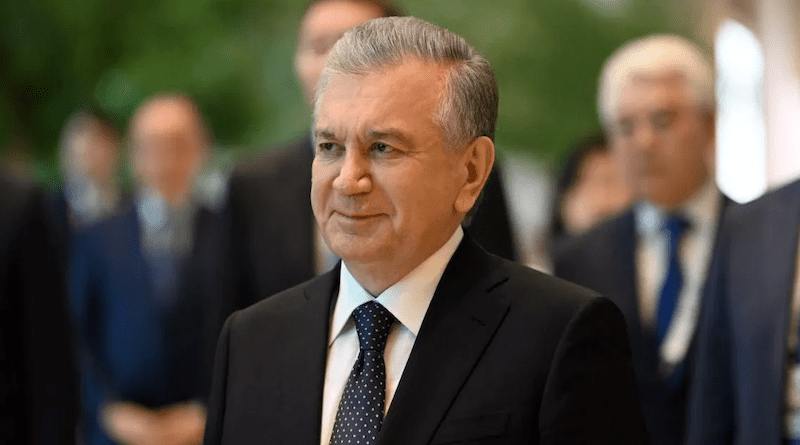Uzbekistan’s Recent Election Is An Advance In Its Political Development – Analysis
By James Durso
Uzbekistan held a snap election for president on 9 July 2023, and the voters went to the polls and returned the incumbent, Shavkat Mirziyoyev, to the job with 87.05 % vote (on an 80.12% turnout). The vote gives Mirziyoyev, in office since 2016, a seven-year term. The recently approved constitution lengthened presidential terms from 5 to 7 years and restarted the term limit clock which remains at two terms, so Mirziyoyev may earn himself 21 years at the helm of the state.
Mirziyoyev was sworn into office on 14 July and may have hinted at a future housecleaning when he declared, “We will bid farewell to any leader who does not respect laws and people, treats them rudely, will be involved in red tape and corruption… They will be replaced by educated young men and women who care for the Motherland and the people…Those who will not reform themselves, we will force them to do so. If they don’t change, we’ll bid them farewell.”
The Organization for Security and Co-operation in Europe OSCE noted the 2023 election, like previous contests, was “technically well-prepared but took place in a political environment lacking genuine competition.”
The OSCE can look forward to returning to Tashkent as Uzbekistan plans parliamentary elections in 2024 for a 2025-2030 term, but will they be held earlier so the administration can immediately press ahead with its reform program?
If so, Uzbekistan’s leaders can press ahead with a new presidential mandate, a renewed constitution (approved by over 90% of voters on 30 April 2023), and a freshly-elected legislature that has been granted new powers by the updated constitution.
There is a dearth of opposition parties, but Mirziyoyev is popular with Uzbek voters who are less enthused about the government he heads. For a while “I’m not Karimov” was sufficient, and Mirziyoyev was able to rein in the security services, open the economy to foreign investment, stop the annual draft of citizens to work in the cotton fields, and start to make Uzbekistan a “normal country.” But now Mirziyoyev has everything he asked of the voters and it is time to deliver more, now that the COVID pandemic and NATO retreat from Afghanistan in the rear-view mirror, and those Russian troops are gone from neighboring Kazakhstan.
The renewed constitution emphasizes human rights and freedoms which has raised expectations and that, coupled with Mirziyoyev’s resounding victory in the election, means the pressure will be on him to continue reforms (which he has declared is his intent). But at the same time, the legislature will be eager to exercise its new responsibilities, such as budget oversight and authority to conduct parliamentary investigations, and oversight of law enforcement and the security service. So, even a legislature heavily populated by supporters of the president’s Liberal Democratic Party and allied National Revival Democratic Party may see struggles with the presidential administration.
With that in mind, early legislative elections may be more productive in the long run. To start, the president may be able to use his momentum from the elections to increase Liberal Democratic Party representation in the upper and lower houses. And the Senate, which now has 100 members (84 elected and 16 appointed) will shrink to 65 (56 elected and 9 appointed) under the renewed constitution and the calendar between now and late 2024 may be slowed by incumbent Senators maneuvering to keep their jobs.
Another result of the legislature’s increased responsibilities may be an increase in the use of professional staff members and the creation of bodies like the Congressional Research Service and Congressional Budget Office that provide analytical support to the American Congress and allow it to offer informed options and critiques to the policies and proposals of the executive branch.
One of a chief executive’s top responsibilities is to hire the right people and the president has it in his hands to create the environment where both the voters and the political class see the potential for new political parties if they are needed. The prospect of upward mobility will encourage ambitious Uzbek politicians to moderate their positions to appear to all the voters rather than permanently stake out a position on the fringe and enjoy the patronage of likeminded, angry supporters (and of foreign governments interested in disruption), but with no chance for advancing the interests of the country. In addition, opportunity will encourage talented Uzbek public executives stay in Uzbekistan instead of working for foreign NGOs or international organizations.
Mirziyoyev had a unique ascension; he was 13 years as the country’s #2 where he acquired a granular knowledge of the system and personalities at all levels, and he benefitted from elite consensus for a prompt and smooth transition after the death of his predecessor, Islam Karimov. He has won the voters’ mandate three times and the country has benefitted from his reform program that includes a renewed constitution that increases the powers of the legislative branch and the judiciary.
The president’s policies and reforms that encourage political pluralism, strengthen state, society, and economy, and ensure the political health of the country – improvements in the human as opposed to the material sphere – will be his true legacy.
This article was published at Real Clear World

